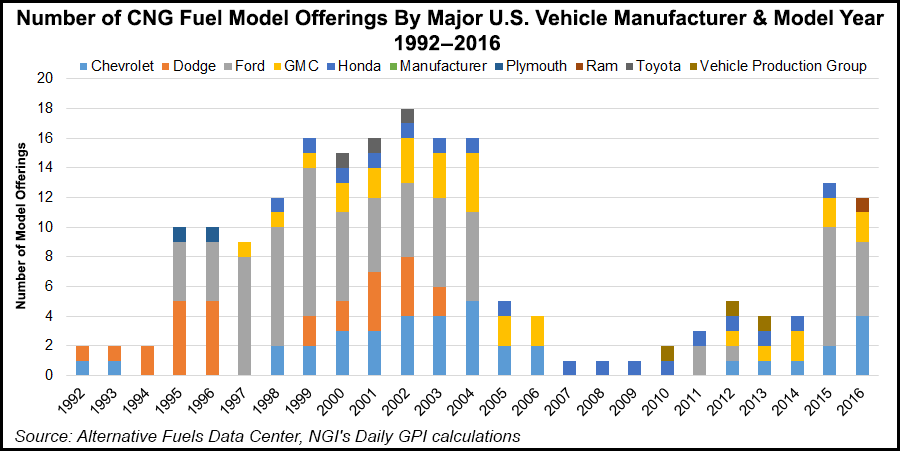Infrastructure | NGI All News Access
SoCal Suburb Goes to Green CNG With Clean Energy Fuels; New Fueling Proliferates
Los Angeles suburb Torrance has inked a multi-year contract for the renewable version of compressed natural gas (CNG) from Clean Energy Fuels Corp. the past supplier of fuel for the city’s natural gas vehicle (NGV) city fleet.

The six-year deal calls for 550,000 gasoline gallon equivalents (GGE) annually using Clean Energy’s Redeem brand renewable natural gas (RNG), or biomethane, that is 70% cleaner than diesel and considered the cleanest transportation fuel now available, according to Clean Energy officials.
“The city made the decision to convert its fleet of buses to RNG as part of its commitment to meeting goals set in its local energy efficiency climate action plan,” Clean Energy said. The Torrance Transit System recently said it had become a 100% alternative fuel bus fleet.
The switch to entirely alternative fuels would not have been possible without what Kim Turner, Torrance director of transit, said was “the partnership developed with Clean Energy and the use of Redeem. By fueling with Redeem, we are able to decrease the amount of greenhouse gas [GHG] emissions and ensure we help provide a healthy community.”
According to Clean Energy officials, the Torrance Transit Department consumes more than 500,000 GGEs annually, and its use of CNG has allowed the city to save $1 for every gallon of fuel used by its bus fleet. Clean Energy constructed the city’s CNG fueling station almost two years ago.
Elsewhere, Love’s Trillium CNG recently added two CNG stations in the states of Washington and Maryland, and the NGV fueling company agreed to design a CNG system at an existing fueling station in Pennsylvania.
Trillium received a grant from the Maryland Energy Administration to help complete the station in Aberdeen, and the Washington state facility is primarily being used to meet the fleet fueling needs of Matheson Postal Services and PepsiCo’s Frito-Lay division.
Both new stations are owned and operated by Trillium and open to the general public 24/7, including light- and heavy-duty trucks. Each station offers two CNG dispensers.
A third light-duty CNG location is scheduled to open early next year at an American Natural convenience store in Sewickley, PA. Two CNG pumps will be added to the store’s current infrastructure.
In Texas, AmpCNG has inked an agreement to develop a new public access CNG fueling station for US Foods in Buda, TX, about 15 miles south of Austin where the food service distributor will be the station’s anchor tenant. AmpCNG officials said the station will have two dual-hose dispensers serving two lanes with the CNG fueling powered by twin 200-horsepower General Electric Gemini compressors, packaged by the energy information technology provider, CDW. The target fueling rate will be 10-12 diesel gallon equivalents/minute, said AmpCNG CEO Grant Zimmerman.
Aside from the new station, US Foods recently was awarded a Texas state emissions reduction plan grant for 40 new CNG trucks that will bring its Buda-based CNG fleet to 50.
To the north, in Canada, Gaz Metro announced plans for a ninth CNG fueling facility as part of its “Blue Road” network of NGV stations to be built with Gain Fuel Canada to support trucks in the Express Mondor fleet. The $3.5 million facility is set for Lanoraie, Quebec on the St. Lawrence River northeast of Montreal and is to be completed by the end of next year.
Montreal-based Gaz Metro will supply the natural gas. Express Mondor is scheduled to acquire 50 new CNG trucks during the next few years.
As far as Italy-based Landi Renzo USA is concerned the new CNG fueling stations will be put to good use when its new lineup of model year 2017 CNG Ford trucks hits the roadways. The 2017 array trucks includes a E-450 chassis shuttle bus, F-250/350 super duty, F-450/550 super duty, F-53/59 strip chassis, and F-650/750 super duty.
Landi holds both U.S. Environmental Protection Agency and California Air Resources Board certifications for its NGVs.
Meanwhile, in terms of truck fuel efficiency technologies, the U.S. Department of Energy’s Advanced Research Projects Agency–Energy (ARPA-E) has provide $5 million aimed at highway truck pairing technology that bids to cut fuel consumption for long-haul trucks by 20%. California-based Peloton Technology is involved in the three-year effort involving its truck “platooning” process.
Peloton is scheduled to begin commercial operations next year, and apply its existing platooning technology pairing long-haul trucks to save an estimated 7% on fuel with reduced drag. The lead truck saves about 4.5% while the following vehicle saves up to 10%.
ARPA-E’s Nextcar program looking at future technologies for connected and autonomous on-road vehicles has a team from Purdue University working under a $5 million stipend to apply advanced control technologies to increase Peloton’s fuel savings up to 20%.
© 2024 Natural Gas Intelligence. All rights reserved.
ISSN © 1532-1231 | ISSN © 2577-9877 |
